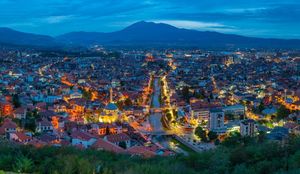Accusations of election fraud and interference have become prominent issues as various nations gear up for upcoming elections, particularly observed through the lens of recent developments around the globe.
Donald Trump’s persistent claims about rampant voter fraud continue to evoke strong reactions, especially within Black communities like those found in Atlanta. Christina Louma, a DeKalb County resident, pinpointed these allegations as “foolishness,” worried they may indirectly intimidate voters. Louma’s views resonate with criticisms of Trump’s approaches, which many view as unfounded and potentially hazardous.
According to Lauren Groh-Wargo, CEO of Fair Fight, the alarm signals are being sounded for what she predicts will be “an avalanche of disinformation” post-election. Such disinformation campaigns, often fueled by xenophobic messaging and unsubstantiated claims about noncitizens voting illegally, might set harmful precedents impacting policy on refugees and immigrants nationally and locally.
Political science professor Dorian Crosby remarked on the precarious situation, highlighting how these narratives could embolden harmful political actions against marginalized groups. For example, Trump’s assertions from 2016 about losing the popular vote due to “illegal voting” have echoed through to recent elections, misleadingly framing voter fraud as an epic crisis.
While election audits by officials, including Secretary of State Brad Raffensperger, have debunked claims of widespread violations, the public's trust is still at stake. For example, from over 8.2 million registered voters, only 20 non-U.S. citizens were found registered—many of whom had never even voted.
These trends were magnified with the emergence of videos on platforms like X, where one claimed to showcase supposed fraudulent voting behaviors, only to be later traced to foreign disinformation efforts. Wayne Kendall, a civil rights attorney, expressed concern about how such narratives create doubt among newly naturalized citizens.
Moving geographically, the case of TikTok's handling of disinformation during elections paints another picture of challenges facing democracy. Accusations have surfaced surrounding the platform allowing misleading election-related content to slip through moderation filters, as evidenced by Global Witness's findings. Their experiment showed 11 out of 14 disinformation videos passing TikTok's approval process, including falsehoods about voting procedures.
The company has since responded, asserting none of these ads were published and reaffirming their bans on political advertising. This incident highlights the struggle of balancing content moderation with political engagement among younger voters, especially during significant elections occurring throughout Europe, like the upcoming Irish government elections.
The Irish election, termed the first significant contest following Sinn Féin's substantial gains in 2020, presents another layer of complexity. The current Taoiseach, Simon Harris, widely regarded as the “TikTok Taoiseach,” leverages social media influence to connect with voters, exemplifying how digital platforms are increasingly intertwined with political discourse.
Back across the Atlantic, the Venezuelan political scene is embroiled with elections and governmental protests. Nicolás Maduro's refusal to concede defeat has led to rising tensions, with seven million Venezuelans fleeing due to political persecution and economic collapse. Amidst this, the opposition candidate, Edmundo González Urrutia, garnered international recognition, marking the potential for changes within the beleaguered nation.
The 600k movement emerged as a beacon of democratic activism within Venezuela. Using volunteers to track and verify votes independently, its efforts starkly contrasted Maduro’s official narratives, which claimed laborious election numbers without proper transparency.
Despite these grassroots efforts to champion democracy, Venezuelans face significant repercussions. Reports of violent suppression against protesters demonstrate the lengths to which the Maduro regime will go to maintain its grip on power. Human rights groups estimate numerous arrests and abuses during recent protests, including claims of torture against activists.
The crux of these multilayered issues suggests something urgent: as technology intermingles with democratic processes, the need for accurate information and transparency is more pressing than ever. From Trump’s claims affecting Black communities to TikTok battling disinformation, and Venezuela’s desperate fight for democratic integrity, these elements coalesce to spotlight systemic vulnerabilities within politics today.
Reflecting on these issues leads to questions about how we navigate the intersection of technology, trust, and governance. What happens when misinformation proliferates within our digital landscapes? How can we enable communities to reclaim their voices, especially those at the margins? These are the questions worth pondering as we proceed through tumultuous political times.



